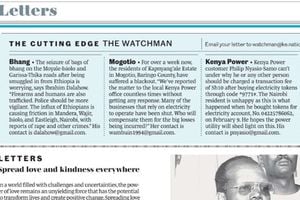
I’ve never seen people going to the bank laughing about their money.
A headline in Nation.Africa reads: “KenGen shareholders laughing all the way to the bank.” But, as a shareholder, I cried all the way to the bank.
You see, the dividend payout of Sh0.30 per share was one of lowest in the history of the electricity generating company. Fifteen years ago, the dividend payout was Sh0.90 per share. Ever since, it has been on a sharp fall, nosediving to Sh0.20 per share in 2022.
KenGen, which is 70 per cent owned by the government, has shed its value in the stock market. In the past five years, its market capitalisation has dropped by 65.5 per cent. It has also been consistently red-flagged by the Auditor-General for misuse and wastage of funds (See “NSE investors lose Sh164bn in State-run firms” by Kepha Muiruri—Business Daily, February 6,2023).
Maybe I’m wandering too far. The purpose of this article is not to assess KenGen’s performance on the stock market. It’s to show how the media employ clickbait headlines and clichés that can mislead or misinform.
A clickbait headline typically exaggerates or sensationalises, promising readers more than there is in the story. The Nation.Africa headline, “KenGen shareholders laughing all the way to the bank,” published last Friday, gives the impression that KenGen shareholders were making huge profits easily—and probably undeservedly.
In journalism, a cliché is a phrase that is used so often that it has lost its original meaning, specificity or freshness. In my article, “New Year resolution for editors: Stop ‘crying all the way to the bank’ cliché” (Daily Nation, January 1, 2021), I argued that there are times when a cliché may be acceptable or unavoidable. But the Nation.Africa headline is not acceptable or unavoidable. It’s lazy journalism.
To laugh all the way to the bank, according to various dictionary meanings, is to earn a lot of money easily, without making much effort, undeservedly, at the expense of others or by cheating. It also means to be unashamedly pleased at making a lot of money by doing something others thought was foolish. It’s like saying you’ve won the lottery or made unworthy profit.
Even as an idiom, “laughing all the way to the bank” is a bit off. I’ve never seen people at the bank laughing about their money. And these days people don’t have to travel to the banks to transact, thanks to digital banking.
In journalism, the problem is that the expression is overused and has lost its originality. There are more than 250 stories in the Nation that have used the cliché, even in headlines. Sometimes, the stories say “smiling” instead of “laughing”.
In some cases, the cliché may be justified. Examples: “Corruption cases involving high-ranking government officials in Kenya is prevalent with ‘tenderpreneurs’ laughing all the way to the bank”, “He sold the leasing contract to vultures out of Egypt and took off to Johannesburg laughing all the way to the bank” and “The Anglo Leasing ghosts have a real reason to smile all the way to the bank”.
The cliché was popularised by Valentino Liberace, an American entertainer who, in 1959, sued the Daily Mirror, of London, for publishing an article that suggested he was a homosexual. At that time, homosexual sex was illegal in the United Kingdom
Liberace was awarded £8,000 in damages, which at the current exchange rate is more than £500,000, according to an article in The Guardian. It was the largest defamation award in British legal history. After the court award, Liberace joked: “I cried all the way to the bank.” Later, he popularised this as “I laughed all the way to the bank”. And hence, “laughing all the way to the bank”.
It’s said Liberace was, in fact, gay. He died of an Aids-related illness in 1987, at 67.
* * *
The Watchman is as professional as ever. In my article last week, “Why ‘The Watchman’ should stop hiding behind the veil of secrecy”, I suggested that The Watchman, who compiles the Cutting Edge, was unprofessional for failing to respond to a reader’s query that had come through me.
I have since established that The Watchman did, indeed, respond through my private email, where it fell through the cracks. My apologies to Watchie! See The Watchman’s response to the query in today’s “Readers Have Their Say” column.
The Public Editor is an independent news ombudsman who handles readers’ complaints on editorial matters including accuracy and journalistic standards. Email: [email protected]. Call or text 0721989264.










